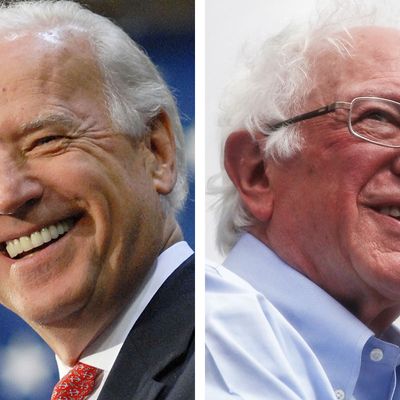
Like a nagging toothache, public opinion indicators keep showing that Americans, and particularly Democrats, don’t like the idea of having a really old president. It’s hard to square with an early 2020 Democratic presidential contest in which the two front-runners are over 75.
Back in late February an NBC/Wall Street Journal survey of adults without regard to party asked about desirable and undesirable traits in presidential candidates. A full 62 percent said they’d either have reservations about, or would be very uncomfortable with, such a prospect (ranking second only to “a socialist” as a discomforting characteristic, which was less than great news for the 77-year-old self-described socialist Bernie Sanders).
A Reuters/Ipsos poll in April showed that among Democrats over half said they’d be less likely to support a presidential candidate if they discovered he or she is over 70.
An April Gallup survey showed 35 percent of Democrats expressing unwillingness to vote for an otherwise qualified over-70 candidate of their party.
And then a May Pew survey of Democrats asked the best age for a president. Only 3 percent reported a preference for septuagenarians (at 47 percent, the 50s were the plurality winner as ideal for presidents).
So what’s up with that? Are Democrats simply finding other qualities of oldsters that outweigh age considerations? Is Perry Bacon Jr. correct in suggesting voters who as an abstract matter prefer younger candidates may feel differently about an individual pol whom they know? Is Helaine Olen right that when pressed voters really just don’t care about age?
It’s possible voters simply don’t know these popular public figures are as old as they actually are. I can’t find any research testing that hypothesis. But whether it’s a matter of ignorance or not thinking deeply about it, this data does open up some possibilities for the campaigns of younger candidates.
First, they could do the research that the public pollsters apparently aren’t doing about voter awareness of candidate age, and whether being informed that a candidate has achieved advanced geezerhood might have an impact.
And second, they could subtly get their comparative youthfulness across in ads that touted their energy and fresh ideas, while presenting images that silently conveyed the decrepitude of the old folks. It could serve as a rehearsal for general election reminders that the junk-food-devouring Donald J. Trump will turn 74 next year.
One objection to age-based comparisons like this is that it might honk off older voters. But there’s some evidence (notably in the Ipsos/Reuters survey) that seniors are more concerned about age-related candidate impairment than anyone, perhaps because they understand what it’s like to lose a step.
There’s also scientific research on the cognitive consequences of that lost step, as Robert Kaiser recently explained:
Studies of old people conclude that between 16 percent and 23 percent of Americans over 65 experience some form of cognitive impairment. Researchers from the Georgia Institute of Technology found that these subjects performed worse than others on tasks involving working memory — the ability to remember information while manipulating it, as when calculating the tip on a restaurant bill — and that they’re more impaired when those tasks become more complex. Older adults also have difficulties with tasks that require dividing or switching attention, like cooking while chatting on the phone. On tests of reasoning, memory and cognitive speed, the average scores for adults in their early 70s were near the 20th percentile of the population, whereas the average performance for adults in their early 20s was near the 75th percentile. A Mayo Clinic study of 161 cognitively normal adults between 62 and 100 years of age showed that declines in learning ability closely track the passage of time. “Research has shown that concept formation, abstraction, and mental flexibility decline with age, especially after age 70, as older adults tend to think more concretely than younger adults,” according to researchers at the University of Alabama at Birmingham, who surveyed several studies. I would hope that impaired executive functioning is not the sort of torture Americans want their president to suffer.
If the 2020 general election really does match Trump against either Biden or Sanders (or arguably Elizabeth Warren, who turns 70 next month, though women’s brains tend to age more slowly than men’s), looking at such sobering evidence could even be conducted on a bipartisan basis, perhaps in conjunction with a closer look than is customary at the qualifications of the Democratic and Republican veep nominees. If it’s indeed the golden age for Golden Girls and Boys in politics, it might be good to get a sense of when “maturity” reaches the point of diminishing returns.






























